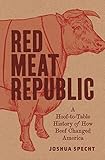Red meat republic : a hoof-to-table history of how beef changed America / Joshua Specht.
By: Specht, Joshua [author.].
Series: Publisher: Princeton, NJ : Princeton University Press, ©2019Copyright date: ©2019Description: 339 p: illustrations ; 23 cm.Content type: text Media type: unmediated Carrier type: volumeISBN: 0691182310; 9780691182315.Subject(s): Beef -- United States | Beef industry -- United States | Food habits -- United StatesGenre/Form: Creative nonfiction. | Print books.| Current location | Call number | Status | Date due | Barcode | Item holds |
|---|---|---|---|---|---|
| On Shelf | TX556.B4 S743 2019 (Browse shelf) | Available | AU00000000015815 |
Browsing Alfaisal University Shelves , Shelving location: On Shelf Close shelf browser

|

|

|

|

|

|

|
||
| TX541 .M68 2014 Umami : unlocking the secrets of the fifth taste / | TX551 .Q53 2016 Quick check food facts / | TX553 .A3 T46 2018 Best before : the evolution and future of processed food / | TX556.B4 S743 2019 Red meat republic : a hoof-to-table history of how beef changed America / | TX560.S9 T47 2023 Sugar rush : Science, politics and the demonisation of fatness | TX560 .S9 W35 2018 Sugar : the world corrupted: from slavery to obesity / | TX631 .W548 2015 First bite : how we learn to eat / |
Includes bibliographical references (pages 261-328) and index.
Introduction ; Making beef modern ; How beef transformed America ; Beyond the United States ; A steer's eye view of the history of American capitalism ; Book overview -- War. The golden age of the plains nomads : buffalo and the spread of horses across the plains ; "A helping hand over this wild and destitute country" : life on the Texas frontier and the Red River War ; Beef handouts and the reservation system ; From war to criminality : retelling the story ; Conclusion -- Range. "As large as all Yorkshire" : buying, counting, and managing cattle ; Land : private and public ; "Cowboy-ism" : cattle workers and western mythology ; "Doomed of its own excesses[?]" : hard winters and the collapse of the industry ; Conclusion -- Market. The cattle marketing system ; From ranch to slaughter ; Horses, water, and stampedes : the ecology of cattle trailing ; Cattle disease and the regulation of mobility ; Between trail and market ; Making a deal ; Conclusion -- Slaughterhouse. Labor ; Refrigerators on wheels ; The decline of wholesale butchering and the rise of dressed beef ; Early regulatory approaches ; Conclusion -- Table. Buying beef ; Canned beef and its critics ; Beef and hierarchy ; Concluding with a meat riot ; Conclusion.
"By the late nineteenth century, Americans rich and poor had come to expect high-quality fresh beef with almost every meal. Beef production in the United States had gone from small-scale, localized operations to a highly centralized industry spanning the country, with cattle bred on ranches in the rural West, slaughtered in Chicago, and consumed in the nation's rapidly growing cities. Red Meat Republic tells the remarkable story of the violent conflict over who would reap the benefits of this new industry and who would bear its heavy costs. Joshua Specht puts people at the heart of his story--the big cattle ranchers who helped to drive the nation's westward expansion, the meatpackers who created a radically new kind of industrialized slaughterhouse, and the stockyard workers who were subjected to the shocking and unsanitary conditions described by Upton Sinclair in his novel The Jungle. Specht brings to life a turbulent era marked by Indian wars, Chicago labor unrest, and food riots in the streets of New York. He shows how the enduring success of the cattle-beef complex--centralized, low cost, and meatpacker dominated - was a consequence of the meatpackers' ability to make their interests overlap with those of a hungry public, while the interests of struggling ranchers, desperate workers, and bankrupt butchers took a backseat. America - and the American table - would never be the same again. A compelling and unfailingly enjoyable read, Red Meat Republic reveals the complex history of exploitation and innovation behind the food we consume today."--Page 2 of cover.


